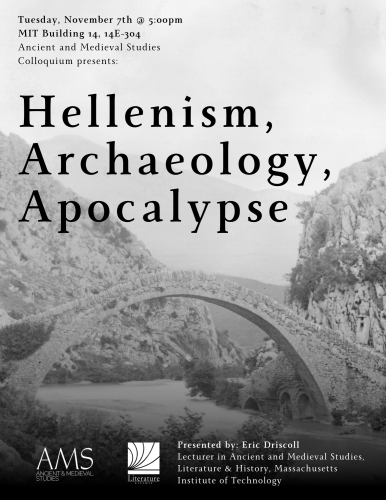Events

- This event has passed.
AMS presents, Eric Driscoll “Hellenism, Apocalypse, Archaeology”
November 7, 2023 @ 5:00 pm - 7:00 pm
 Tuesday, November 7th @ 5:00pm
Tuesday, November 7th @ 5:00pmBuilding 14, Room 14E-304 (map)
Presented by: Eric Driscoll, Lecturer in Ancient and Medieval Studies Literature & History,
Massachusetts Institute of Technology
Abstract: This talk offers a reading of Kostas Vrettakos’s 1980 documentary short, The Layer of Destruction, in the context of the modern Greek archaeological and folkloric imaginaries. In the 1970s, Greece constructed a dam across the Mornos river, near the southern end of the Pindus Mountains, to create a reservoir that would supply Athens with drinking water. Today, below the waters of this artificial lake lie the remains of an ancient city, Kallipolis or Kallion. In Layer of Destruction, Vrettakos creates a lyrical memorial for Kallion by depicting his visits to the excavations conducted in the late 1970s as the reservoir’s rising waters threatened and eventually covered the site. In the Greek national narrative, archaeological excavation is conceived as an additive process that recovers what Yannis Hamilakis calls “fragments of national memory” and thereby restitutes missing fragments of a collective history. But in Vrettakos’s film, archaeology emerges instead as a form of destruction, a force that—in the language of Jacob Taubes—reinserts time into eternity and suggests that “the order of the world is gripped by death,” that “time… moves toward an end.” Recovering artefacts does not fully recuperate memory or revivify lost time, but in fact accelerates their ultimate loss. What does it mean to see national archaeology as destructive, self-contradictory, and apocalyptic rather than triumphant and restorative? Read more here…
Bio: Eric Driscoll is a Hellenist, classical archaeologist, and historian of the ancient Mediterranean world. He studied Classics at the University of Chicago and holds a PhD in Ancient History and Mediterranean Archaeology from the University of California, Berkeley. Before moving to Cambridge in 2021 to teach at Harvard and now at MIT, where he is Lecturer in Ancient and Medieval Studies, Eric lived in Greece for five years, including two spent serving as the Assistant Director of the American School of Classical Studies at Athens.
Literature Section
Massachusetts Institute of Technology
77 Massachusetts Avenue 14N-407
Cambridge, MA 02139
tel: (617) 253-3581
